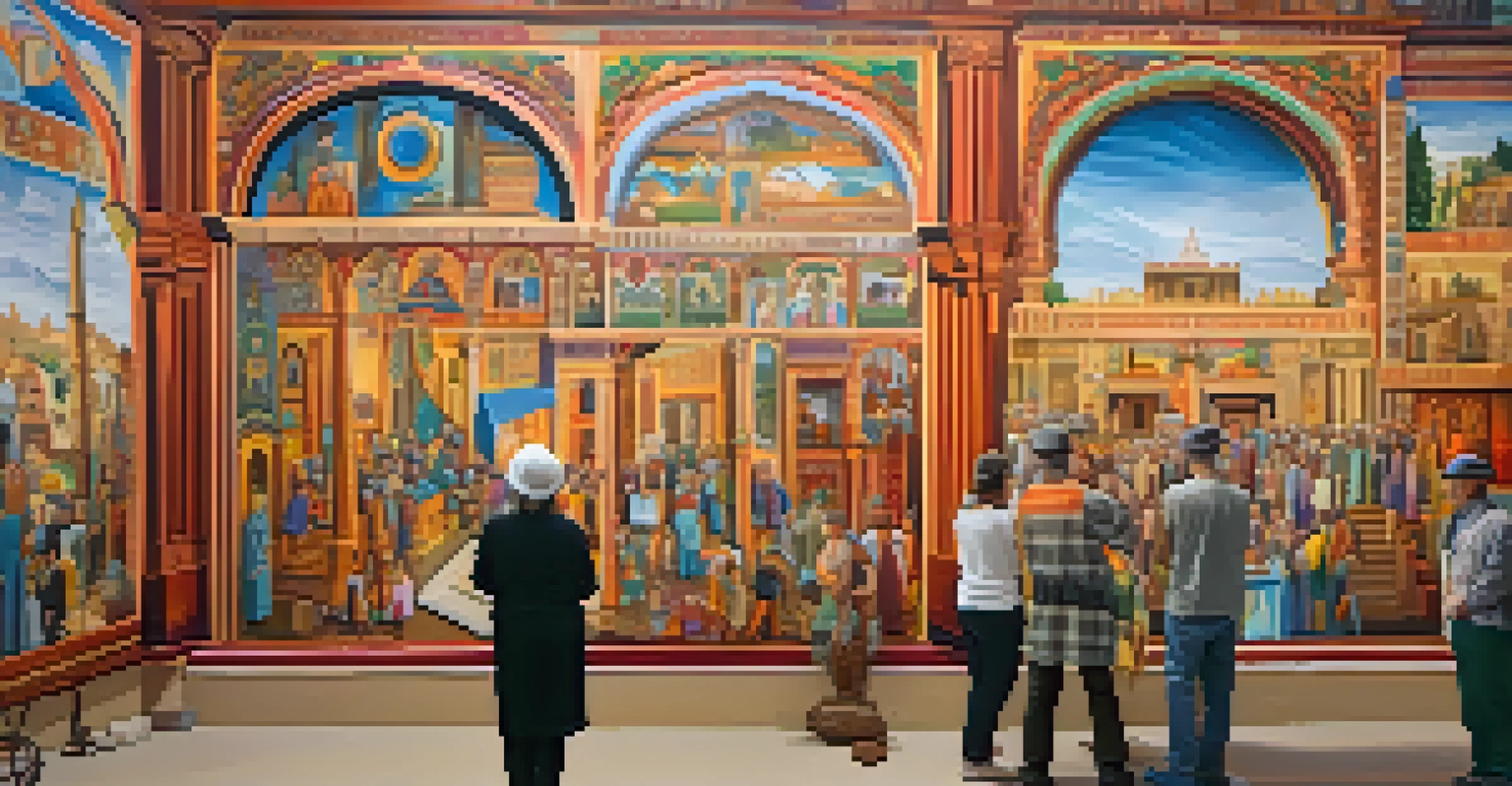Georgia's Jewish Heritage: Traditions and Community Impact

A Brief History of Jewish Life in Georgia
Jewish presence in Georgia dates back to the early 18th century, primarily with the arrival of Ashkenazi Jews fleeing persecution in Europe. Their migration marked the beginning of a rich tapestry of Jewish life in the region, contributing significantly to the state’s cultural diversity. Over the years, Sephardic Jews also settled in Georgia, adding to the community's depth and vibrancy. Today, Georgia boasts one of the oldest Jewish communities in the United States, with roots that intertwine with the state's development.
The Jewish community, like all communities, must adapt and grow to ensure their traditions are preserved for future generations.
The establishment of Jewish congregations and organizations has played a pivotal role in preserving cultural identities and traditions. From the first synagogue built in Savannah in 1733 to the flourishing Jewish cultural institutions today, these efforts have helped maintain a strong sense of community. Events such as the Jewish Food Festival and the Yom Kippur services reflect the community's commitment to tradition and continuity. As a result, Jewish life has become an integral part of Georgia's rich historical narrative.
The story of Georgia's Jewish community is one of resilience and adaptation, as they have navigated challenges while contributing to the broader society. Jewish Georgians have made significant contributions to various sectors, including business, education, and social justice. Their influence is evident in the cultural landscape of Georgia, where Jewish traditions continue to thrive alongside those of other communities. This interwoven history showcases a unique blend of cultures that defines Georgia today.
Cultural Traditions: Celebrations and Practices
Georgia's Jewish community celebrates a variety of cultural traditions that showcase their rich heritage. Significant holidays such as Passover, Rosh Hashanah, and Hanukkah are marked by family gatherings and community events that bring people together. These celebrations often include traditional foods, prayers, and rituals that honor their ancestors and religious teachings. The joy and warmth of these occasions foster a strong sense of belonging and connection among community members.

One noteworthy tradition in Georgia is the practice of holding community Shabbat dinners, which create an inviting atmosphere for congregants and newcomers alike. These dinners often feature homemade dishes, stories, and songs that enhance the communal spirit. It's a time for reflection and gratitude, allowing individuals to step away from the hustle and bustle of daily life. By sharing meals and experiences, the community strengthens its bonds and reinforces its cultural identity.
Rich Jewish Heritage in Georgia
Georgia is home to one of the oldest Jewish communities in the U.S., showcasing a blend of Ashkenazi and Sephardic traditions that enrich the state's cultural diversity.
In addition to religious observances, the Jewish community in Georgia actively participates in interfaith events that promote understanding and cooperation. These initiatives provide opportunities to share their traditions with others, helping to break down barriers and foster relationships. By engaging with a diverse range of communities, Georgia's Jewish population not only preserves their heritage but also enriches the cultural fabric of the state.
Education and Jewish Learning in Georgia
Education plays a vital role in preserving Jewish identity and passing down traditions to future generations. In Georgia, Jewish day schools and religious education programs provide a foundation for students to learn about their heritage and values. These institutions emphasize both academic excellence and Jewish teachings, cultivating well-rounded individuals who can actively contribute to society. Through engaging curricula and dedicated educators, children gain a deep understanding of their cultural roots.
Art is the most beautiful of all lies; it is a reflection of our culture and experiences, connecting us to our roots and each other.
Additionally, community centers and synagogues often host classes and workshops that cater to various age groups. These programs cover a range of topics, from Hebrew language learning to Jewish history and culture. By promoting lifelong learning, Georgia's Jewish community ensures that individuals of all ages can connect with their heritage. This focus on education fosters a sense of pride and responsibility towards their traditions.
The commitment to education in the Jewish community also extends beyond formal settings, with informal gatherings and study groups that encourage discussion and exploration. These gatherings allow members to delve deeper into religious texts and contemporary issues, fostering critical thinking and dialogue. As a result, education serves not only as a means of preserving tradition but also as a tool for empowerment within the community.
Community Organizations and Their Impact
Community organizations play an essential role in supporting and uplifting Georgia's Jewish population. From the Jewish Federation of Greater Atlanta to local synagogues, these organizations provide resources and services that address various needs within the community. They host events, fundraisers, and outreach programs that not only strengthen community ties but also help those in need. By fostering a sense of solidarity, these organizations contribute to the overall well-being of Jewish Georgians.
Many of these organizations also focus on social justice initiatives, advocating for issues that affect both the Jewish community and society at large. They engage in interfaith dialogues and partnerships with other groups to promote understanding and cooperation. Through these efforts, they aim to combat discrimination and support marginalized communities, reflecting the Jewish values of tikkun olam, or repairing the world.
Community Engagement and Resilience
The Jewish community in Georgia actively participates in cultural, educational, and social justice initiatives, demonstrating resilience and a commitment to supporting one another.
In addition, community organizations offer a platform for leadership development and volunteerism, encouraging members to take an active role in shaping their community. Programs designed for young professionals and families foster networking and mentorship opportunities that empower individuals. This investment in leadership not only strengthens the community but also ensures its sustainability for future generations.
Art and Music: Expressions of Jewish Identity
Art and music serve as powerful mediums for expressing Jewish identity and culture in Georgia. Local artists and musicians often draw inspiration from their heritage, creating works that reflect their experiences and traditions. From vibrant paintings to soulful melodies, these creative expressions resonate within the community and beyond, inviting others to engage with Jewish culture. Art galleries and music festivals frequently showcase these talents, allowing for a rich exchange of ideas and creativity.
The Jewish Film Festival, held annually in Atlanta, is another example of how art fosters community connection. This event features films that explore Jewish themes, history, and experiences, sparking discussions and reflections among attendees. By highlighting diverse narratives, the festival not only entertains but also educates, promoting greater understanding of the Jewish experience. These cultural events create a vibrant atmosphere where the community can come together to celebrate their heritage.
Moreover, traditional Jewish music, such as Klezmer, has found a home in Georgia, with local bands bringing this lively genre to life. Community members often participate in dancing and singing, reinforcing bonds through shared joy and celebration. These artistic expressions contribute to the cultural richness of Georgia, showcasing how Jewish traditions continue to evolve while remaining rooted in history.
Challenges and Resilience of the Jewish Community
Like many communities, Georgia's Jewish population has faced challenges over the years, including discrimination and anti-Semitism. However, the community's resilience has shone through in the face of adversity. Through collaboration and support from various organizations, Jewish Georgians have actively worked to combat these issues while fostering a safe environment for their members. This unwavering commitment to resilience illustrates the strength of the community's spirit.
In recent years, there has been a renewed focus on addressing mental health and social issues within the community. Organizations have begun to create resources and support networks that cater to these needs, fostering an environment of understanding and compassion. By acknowledging these challenges, the community can work together to find solutions and provide assistance to those in need. This proactive approach demonstrates the community's commitment to nurturing the well-being of its members.
Art and Culture as Identity
Art and music play a vital role in expressing Jewish identity in Georgia, with local artists and cultural events fostering connection and understanding within and beyond the community.
Furthermore, the Jewish community in Georgia has taken steps to educate others about their culture and history, promoting tolerance and acceptance. Initiatives such as community open houses and educational programs aim to dispel myths and foster understanding among diverse groups. By sharing their story, Georgia's Jewish population contributes to a broader dialogue about diversity and inclusion, emphasizing the importance of solidarity in creating a harmonious society.
Looking Ahead: The Future of Jewish Life in Georgia
As we look to the future, Georgia's Jewish community is poised for continued growth and evolution. Younger generations are becoming increasingly engaged with their heritage, seeking ways to connect with their roots while also embracing modernity. This balance of tradition and innovation is vital for maintaining a vibrant community that resonates with all ages. Programs targeting youth involvement and leadership development are essential in ensuring their voices are heard.
Moreover, the integration of technology into community initiatives has opened new avenues for connection and engagement. Virtual events, online learning opportunities, and social media platforms have made it easier for members to stay connected, even amidst challenges like the COVID-19 pandemic. This adaptability highlights the community's resilience and commitment to fostering relationships, regardless of the circumstances.

Looking ahead, there is a strong emphasis on collaboration with other cultural and faith communities. By building bridges and fostering partnerships, Georgia's Jewish community can continue to play a vital role in promoting understanding and acceptance. As they navigate the complexities of the modern world, the community's enduring spirit and commitment to its traditions will undoubtedly shape a bright future.